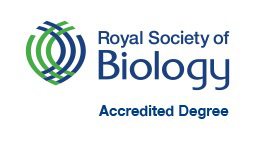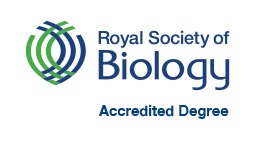Biology (with integrated year in industry) Code C102 Attend an Open Day Attend an Open Day
Apply NowKey Facts
C102-
UCAS Tariff
120 - 104
-
Course duration
4 years
Available for September start 2026
Further details on entry requirements
Apply NowIf you are fascinated by all aspects of the living world, you will thrive on our BSc Biology degree here at Aberystwyth University. You will explore a whole host of diverse topics that cover the cellular and molecular up to whole organisms. You will also learn how biology can be used in practical ways that can contribute to improving the quality and sustainability of life – a subject that is highly relevant to the challenges posed by climate change. The year that you spend away from Campus working in industry will give you the additional insight, knowledge and experience that are highly valued by employers. From proteins to puffins, our BSc Biology degree explores everything that the living world has to offer, and you will find that Aberystwyth University is located in one of the best places to uncover and understand the wonders of the natural world.
Course Overview
Modules September start - 2026
Please note: The modules listed below are those currently intended for delivery during the next academic year and may be subject to change. They are included here to give an indication of how the course is structured.
| Module Name | Module Code | Credit Value |
|---|---|---|
| Cell Biology * | BR17520 | 20 |
| Comparative Animal Physiology | BR16720 | 20 |
| Ecology and Conservation * | BR19320 | 20 |
| Genetics, Evolution and Diversity | BR17120 | 20 |
| Microbial and Plant Diversity * | BR19920 | 20 |
| Skills for Biologists * | BR16820 | 20 |
| Module Name | Module Code | Credit Value |
|---|---|---|
| Climate Change: Plants, Animals and Ecosystems | BR21120 | 20 |
| Evolution and Molecular Systematics | BR21720 | 20 |
| Practical and Professional Skills in Microbiology | BR24720 | 20 |
| Research Methods * | BR27520 | 20 |
Options
| Module Name | Module Code | Credit Value |
|---|---|---|
| Applied Molecular Biology and Bioinformatics | BR20620 | 20 |
| Cell and Cancer Biology | BR25920 | 20 |
| Chromosome Dynamics | BR21820 | 20 |
| Controlled Environment Crop Production and Horticulture | BR23520 | 20 |
| Freshwater Biology | BR22020 | 20 |
| Introduction to Geographic Information Systems and Landscape Ecology | BR25520 | 20 |
| Invertebrate Zoology | BR25420 | 20 |
| Marine Biology | BR22620 | 20 |
| One Health Microbiology | BR26520 | 20 |
| Proteins and Enzymes | BR26620 | 20 |
| Tropical Zoology Field Course | BR23820 | 20 |
| Vertebrate Zoology | BR26820 | 20 |
| Wildlife Surveying | BR29620 | 20 |
| Module Name | Module Code | Credit Value |
|---|---|---|
| Integrated Year in Industry | BRS0060 | 60 |
| Integrated Year in Industry | BRS0160 | 60 |
| Module Name | Module Code | Credit Value |
|---|---|---|
| Biotechnology | BR35520 | 20 |
| Global Biodiversity Conservation | BR33420 | 20 |
| Research Project * | BR36440 | 40 |
Options
| Module Name | Module Code | Credit Value |
|---|---|---|
| Bioinformatics and Functional Genomics | BR37120 | 20 |
| Fish Biology, Fisheries and Aquaculture | BR33220 | 20 |
| Freshwater Biology Field Course | BR37720 | 20 |
| Frontiers in Plant Science | BR35820 | 20 |
| Microbial Pathogenesis | BR33720 | 20 |
| Parasitology | BR33820 | 20 |
| Terrestrial Ecology Fieldcourse | BR36620 | 20 |
| Wildlife Conservation | BR34520 | 20 |
* Also available partially or entirely through the medium of Welsh
Careers
Teaching & Learning
Typical Entry Requirements
UCAS Tariff 120 - 104
A Levels BBB-BCC with B in Biology
GCSE requirements (minimum grade C/4):
English or Welsh, Science and Mathematics
BTEC National Diploma:
DDD-DDM in a specified subject
International Baccalaureate:
30-28 with 5 points in Biology at Higher Level
European Baccalaureate:
75%-65% overall with 7 in Biology
English Language Requirements:
See our Undergraduate English Language Requirements for this course. Pre-sessional English Programmes are also available for students who do not meet our English Language Requirements.
Country Specific Entry Requirements:
International students whose qualification is not listed on this page, can check our Country Specific Entry Requirements for further information.
The University welcomes undergraduate applications from students studying the Access to Higher Education Diploma or T-level qualifications, provided that relevant subject content and learning outcomes are met. We are not able to accept Access to Higher Education Diplomas or T-levels as a general qualification for every undergraduate degree course.
Our inclusive admissions policy values breadth as well as depth of study. Applicants are selected on their own individual merits and offers can vary. If you would like to check the eligibility of your qualifications before submitting an application, please contact the Undergraduate Admissions Office for advice and guidance.


